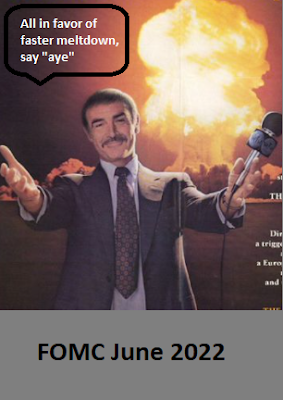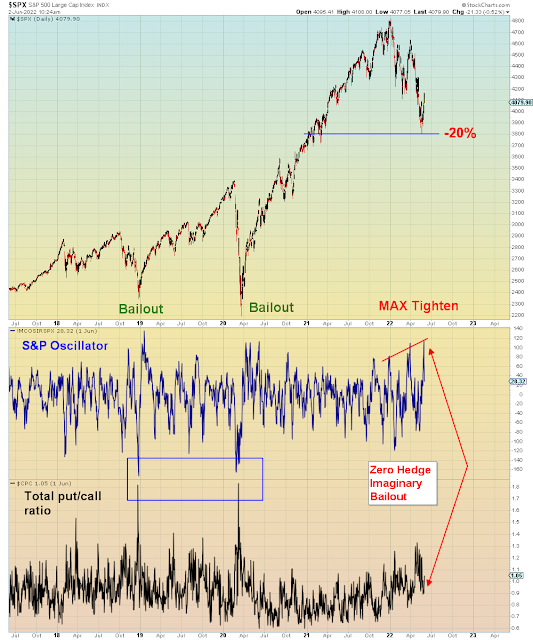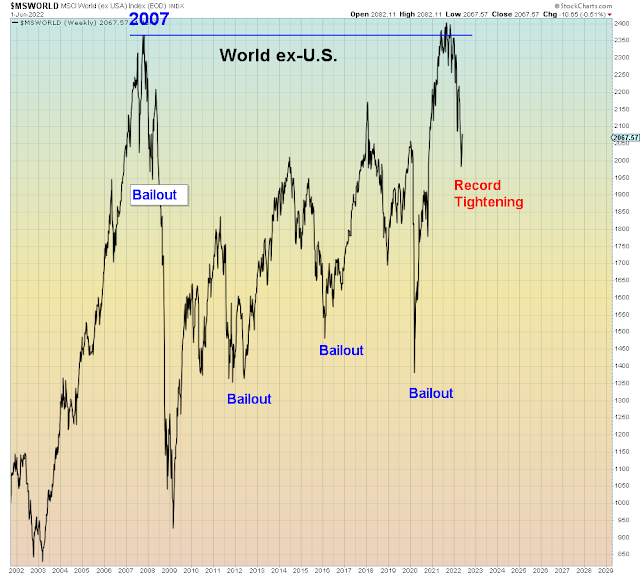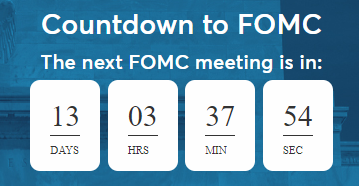An unprecedented hurricane of risks. Plus collapsed liquidity. The fastest Fed tightening cycle on record. And calls to buy risky assets. All from the same Wall Street bank. What's not to like?
JP Morgan CEO Jamie Dimon warned yesterday about a looming "Hurricane of economic risks". Last week he was sanguine, this week he's raising the alarm. He specifically is concerned about Quantitative Tightening - the reduction of the Fed balance sheet at double the pace of 2018, which ended badly. He is also concerned about the commodity shocks emanating from the war in Ukraine.
“We’ve never had QT like this, so you’re looking at something you could be writing history books on for 50 years”
Last week, Dimon referred to his economic concerns as “storm clouds” that could dissipate...But his concerns seem to have deepened since then."
What changed in the past week? What does he know that we don't know?
What Dimon doesn't mention is that both of the key risks he mentioned are highly correlated. The ever-escalating sanctions are creating a commodity supply shock which is forcing global central banks to tighten monetary policy at the fastest pace in decades:
"Policymakers around the world have announced more than 60 increases in current key interest rates in the past three months, according to an FT analysis of central banking data — the largest number since at least the start of 2000"
Here we see copper rolling over into a death cross as global growth implodes. Many pundits forget that it was China that pulled the global economy out of recession after 2008. However, the PBOC is one of the few central banks actively cutting rates.
For now, oil and commodities are in a push/pull between supply disruptions and the resulting demand destruction which is leading to recession. In the end, demand destruction ALWAYS wins out.
Repeated calls for $185/bbl oil by JP Morgan in 2022 have yet to come to pass. Russia has so far been able to bypass the sanctions by selling their oil to China and India.
"India bought 27 million barrels of Russian oil in April and 21 million in May, compared to 12 million barrels it bought from Russia in all of 2021"
In addition, as I write we just got word that OPEC will increase output faster than expected:
“Whilst it’s not an outright promise, Saudi Arabia [has] seemingly thrown the West a bone”
The pre-FOMC silent period begins COB this Friday. However, the Fed once again is entering this meeting on an extremely hawkish tone. Bullard reiterated he wants a 3.5% Fed Funds rate in 2022 which means .5% rate hikes at EVERY remaining meeting in 2022.
“This 50 basis point per meeting increase is twice the normal pace that the committee has used in recent years"
So there you have it. DOUBLE quantitative tightening and DOUBLE rate hikes going into the lowest liquidity period of the year:
May 17th, 2020:
"Liquidity, or the ease of trading, in S&P 500 futures is worrisome even by the standards of the Covid-spurred meltdown more than two years ago, according to JPMorgan"
“This implies that the ability of markets to absorb relatively large orders without significantly impacting the price is very low at the moment.”
One side effect of the Fed’s absence as a backstop buyer is that there is greater risk of market fragility when shocks do arise"
To top it all off, JP Morgan's head stock market analyst advises everyone to buy risk assets:
He mentions corporate buybacks as a reason to buy stocks, however corporate buybacks always peak at the end of the cycle. It's the only way to artificially boost share price when earnings growth is slowing.
Which gets us to the casino set-up going into the strictest Fed tightening on record.
The S&P is two years overbought and the two prior overbought readings this year led to rollover AHEAD of the FOMC. In addition, there has been ZERO capitulation by traders:
The rest of the world ex-U.S. just made its fifth lower weekly high:
In summary, the exact same major bank sees unprecedented risks, record low liquidity, and yet still advises buying risky assets. Investors have NO CHANCE to survive in this ridiculously confused environment. There is far too much conflict of interest masquerading as market expertise.
The sheeple are lambs to the slaughter.
And what's new?










